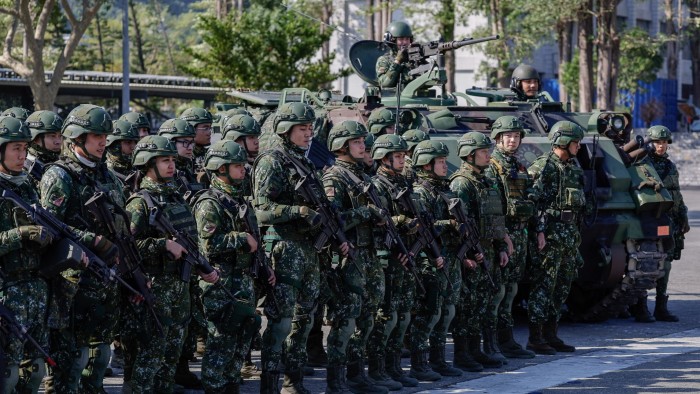Good morning. In today’s newsletter:
-
Huawei challenges Nvidia in China
-
Land disputes hold back India’s green energy revolution
-
Malaysia ties its fortunes to Singapore
Taiwan’s parliament has frozen critical parts of the 2025 defence budget, heightening the risk that the country provokes the ire of US President Donald Trump at a moment when it needs firm support from Washington against security threats from China.
Taipei has been eager to demonstrate to the new US administration that it is stepping up efforts to strengthen its defences. Trump claimed in July that Taiwan “doesn’t give us anything” and compared the US to “an insurance company” for the island nation’s security.
But just hours after Trump was inaugurated to a second term on Monday, Taiwan’s opposition-controlled legislature voted to freeze half the country’s budget for its submarine programme, 30 per cent of the military’s operations expenditure and one-third of the funding for a drone industry park. It also cut 60 per cent of the defence ministry’s publicity budget.
Taiwanese government officials and ruling party lawmakers accused the Kuomintang, the largest opposition party, of helping China by undermining President Lai Ching-te’s minority government.
“Our defence will move backwards this year,” said Po Horng-huei, vice-minister of defence. Read the full story.
-
US-China relations: Trump said that tariffs on China could hinge on a deal over TikTok’s ownership, as he signed an executive order on Monday to keep the popular short-form video platform online in the US for 75 days.
Here’s what else we’re keeping tabs on today:
-
Economic data: Taiwan reports December labour market figures and Malaysia publishes monthly inflation data.
-
Monetary policy: Malaysia announces its rate decision.
Five more top stories
1. Exclusive: Huawei is seeking to grab a larger share of the Chinese market for artificial intelligence chips dominated by Nvidia. Instead of challenging the US chipmaker in training large language models, Huawei is positioning its latest Ascend AI processors as the hardware of choice for the computation used by LLMs to generate responses to prompts — or so-called “inference” tasks.
2. Panama’s government on Monday began an audit of Hong Kong-based Hutchison Ports, the company that operates ports at either end of its canal, in a move seen as a concession to US President Donald Trump. The new president has threatened to take back the waterway, which handles about 3 per cent of global seaborne trade each year, over alleged Chinese influence.
3. Trump has threatened to double tax rates for foreign nationals and companies in the US to hit back at “discriminatory” levies on American multinationals, as he primed his administration for a wide-ranging international tax fight.
4. Goldman Sachs has promoted a new generation of executives to head its key investment banking and trading businesses as the bank prepares to capitalise on an expected Wall Street boom under US President Donald Trump. Read more about the overhaul of Goldman’s top ranks.
5. Saudi Arabia’s investment mining fund is set to buy a stake in Pakistan’s Reko Diq project, which will be one of the world’s largest copper mines once complete. The kingdom plans to buy 10-20 per cent of the $9bn complex, which is being developed by Barrick Gold, as it looks to accelerate its diversification away from oil.
-
More mining news: Indonesia is considering potential cuts to nickel ore supplies to help boost prices amid a global glut, in a move that could put the brakes on rapid production growth in the south-east Asian nation.
The Big Read
In India, the third-biggest carbon polluter globally, billions of dollars are being poured into projects to meet government targets to more than double its non-fossil fuel sources of power by the end of the decade. But this breakneck effort to build clean energy infrastructure is sparking bitter land disputes between companies and the people who rely on farming to make a living.
We’re also reading . . .
-
‘Will Trump even notice Europe?’: Ukrainian leader Volodymyr Zelenskyy delivered an unflinching critique in Davos of the continent’s weakness.
-
Is Hamas back?: The sight of militants on the streets of Gaza since the ceasefire took effect raises the possibility that they may again run the enclave.
-
War on drugs: Liberal reformers have been too hesitant to spell out the negative consequences for others, writes Stephen Bush.
Map of the day
As tensions ratchet up between two of Malaysia’s biggest trading partners, the US and China, the south-east Asian nation is increasingly looking to hitch its wagon to its more successful neighbour, Singapore. A special economic zone straddling the two countries is one of several initiatives designed to help the pair withstand tougher global economic trading conditions.
Take a break from the news . . .
Almost 19,000 games were released last year via digital distribution platform Steam, and 2025 promises far more. In an age of unprecedented gaming abundance, FT video game critic Tom Faber writes it’s time to rethink how and what we play.
Read the full article here

